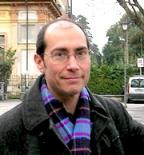James Berger
Ph.D. University of Virginia, 1994
M.A. Teachers College, Columbia University, 1981
B.A. Columbia University, 1976
I teach courses on apocalyptic literature and film, utopias and dystopias, historical fiction, disability studies, animal studies, and the status (past/present/[future?]) of the Humanities.
At present, I’m engaged in two research projects. First, I’m trying to understand what are the forces impeding our ability to imagine a future that is just and sustainable–not just to achieve such a future, but even to imagine it. “All that is now proved was once only imagined,” wrote William Blake. What then are the impasses of our imagination? This will be a study of speculation, markets, and risk analysis; a study of climate science, climate politics, climate fiction and climate denial; a study of human psycho-social-ideological adaptation and the question posed by the philosophers Julian Savelescu and Ingmar Perrson, are we “unfit for the future”? Do we require genetic improvements, assistance from AI, intervention from aliens, better union organizers, or simply a new religion? As need requires, I study zombies, the necrological limit case of the unlivable future. All this will, I hope, culminate in a book entitled “The Book of Impasses.”
Second, I am trying to figure out a method for writing about poetry. Is there some true way to respond to and engage with a poem that is not just writing another poem? I don’t want to write scholarship. I love reading literary history, but I don’t want to write literary history. I don’t want to “review” the poem. (Re-View? View it again? How do you view it for the first time?). I want to conjure some way to witness a poem, to be in some “unmediated” (?!) relation to the poem. Surely that cannot be done. So, how can I do it?! Following Schiller, I want to write a “Naive and Sentimental Poetics.” (!).
I figure this will keep me busy for a while.
Interests
Twentieth- and Twenty-first-century American literature, literary theory, disability studies, apocalyptic literature and film, neuroscience and literature
Selected Publications
- “Propogation and Procreation: The Zombie and the Child.” Race, Gender, and Sexuality in Post-Apocalyptic TV and Film. Ed. Barbara Gurr. Houndmills U.K. and New York: Palgrave MacMillan, 2015. 149-63.
- “This is the Media’s Real Bias: Pro-Business, Pro-Corporate, Pro-CEO.” Salon. October 30, 2015. Online.
- “ ‘The Voice of the Bridegroom and the Bride Shall be Heard No More’: Apocalypse, Critique, and Procreation.” Frame: Journal of Literary Studies. 26 (2013): 125-42.
- “Alterity and Autism: Mark Haddon’s Curious Incident in the Neurological Spectrum.” Autism and Representation, ed. Mark Osteen. New York and Oxford: Routledge, 2007. 271-88.
- “Falling Towers and Postmodern Wild Children: Oliver Sacks, Don DeLillo, and Turns Against Language.” PMLA 120 (2005): 341-61.
- “Trauma Without Disability, Disability Without Trauma: A Disciplinary Divide.” JAC: A Quarterly Journal for the Interdisciplinary Study of Rhetoric, Writing, Multiple Literacies, and Politics 24 (2004): 563-82.






